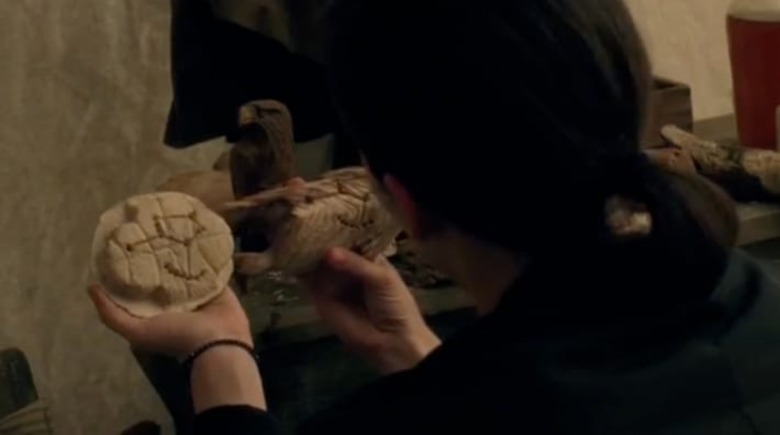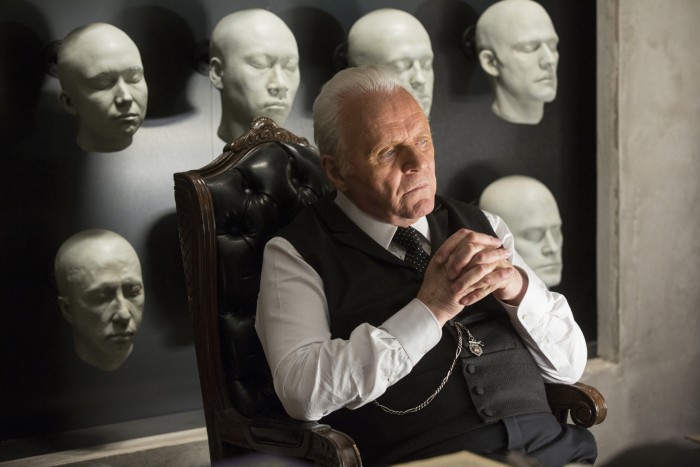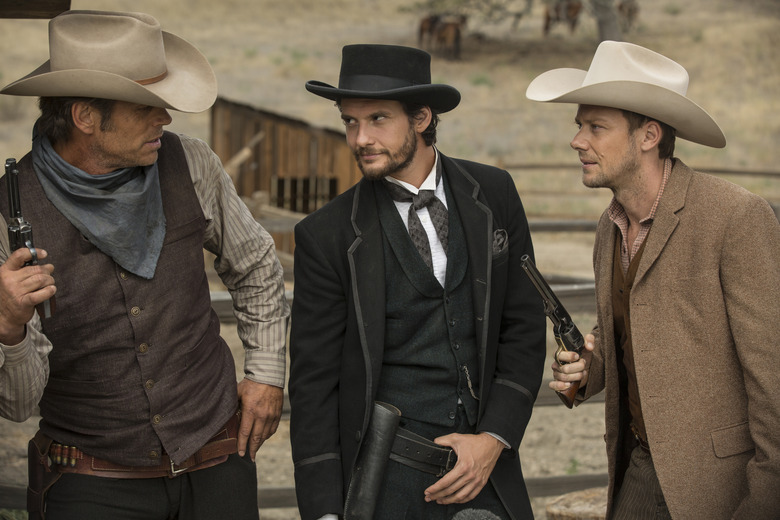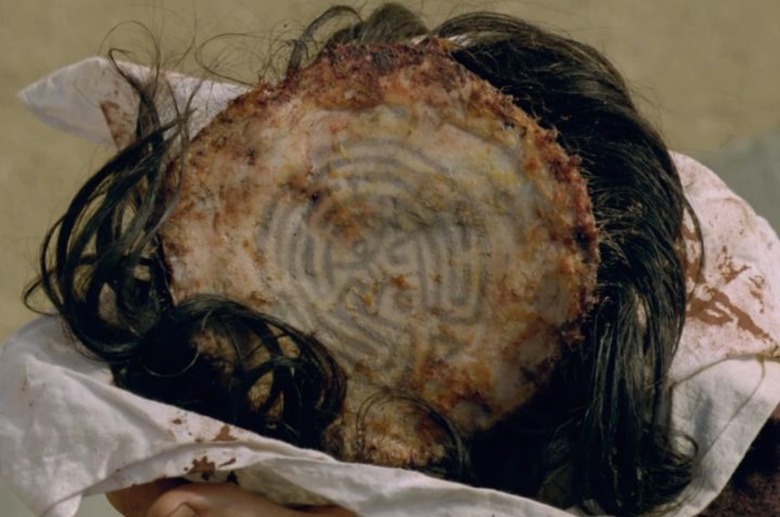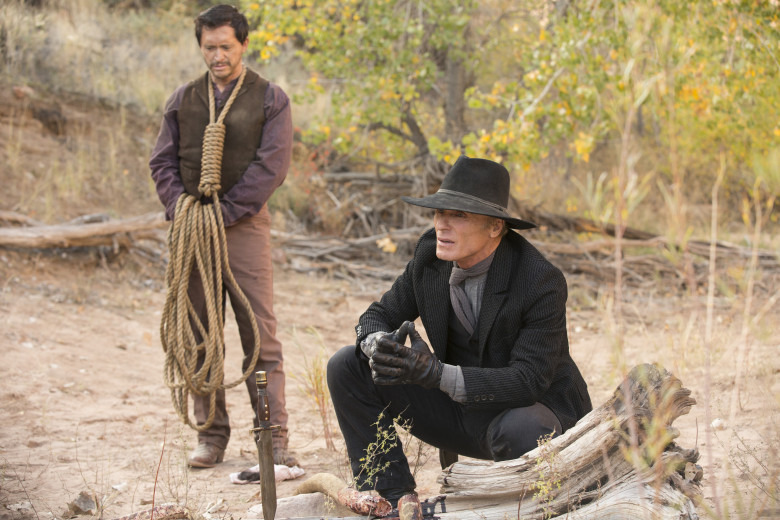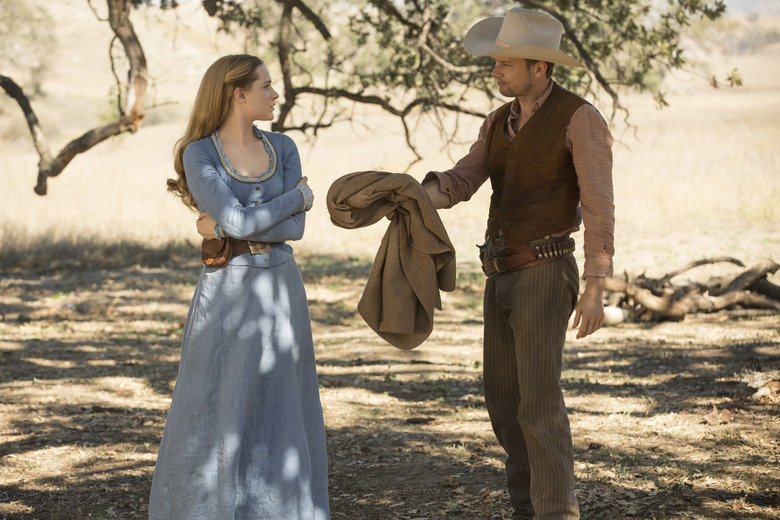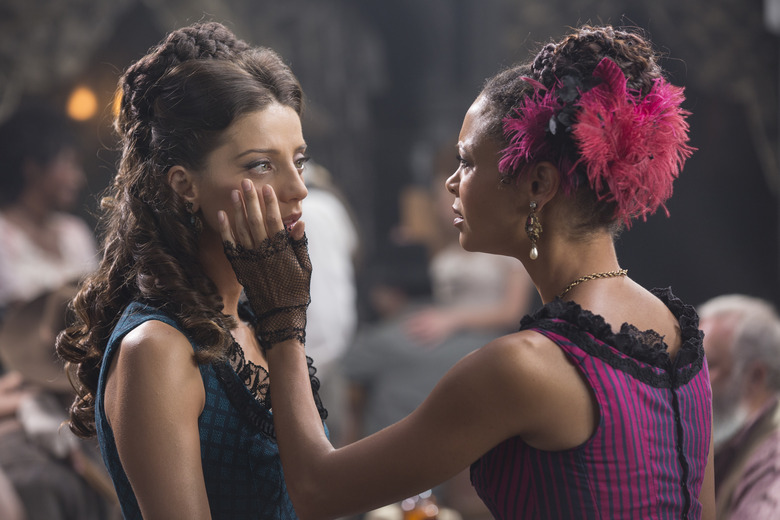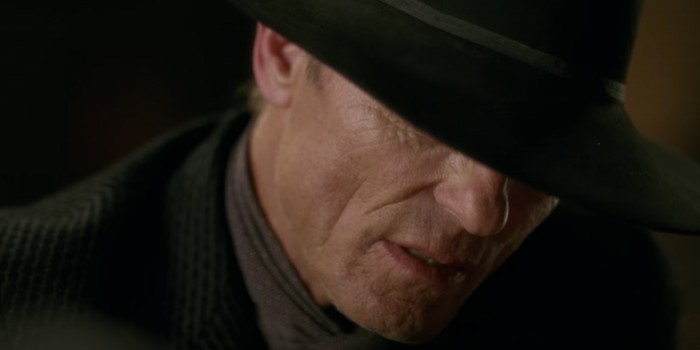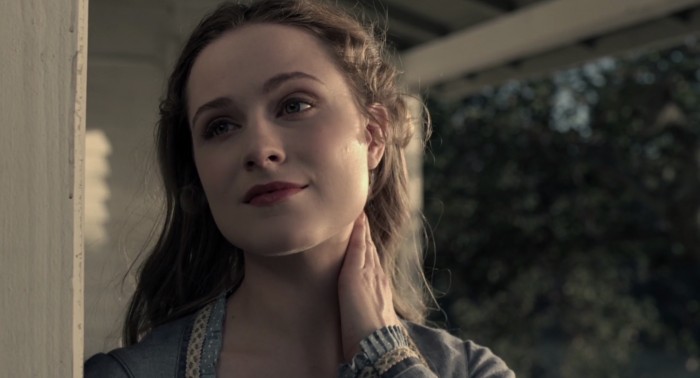'Westworld' Spoiler Review: 10 Questions From "Dissonance Theory"
The fourth episode of Westworld's first season, titled "Dissonance Theory," was another barn-burning hour of television filled with so many details and moments worth considering that ten questions simply doesn't feel like enough. But we have a format, and we're sticking to it. As with past weeks, the questions raised here are rhetorical and literal, with some having easy answers, some ending in pure speculation, and others merely existing as an excuse to talk about a particular scene or character.
Why Did Arnold Go Insane?
We still don't know exactly what happened to Arnold, Ford's old partner who mysteriously died in the early days of the park. However, he does get name-dropped a few times. First by the Man in Black, who seems to know the vague details of the park's history in the same way that Disneyland obsessives can name the men and women who helped turn Walt Disney's crazy dream into a reality. And later by Ford in a conversation with Theresa Cullen. Much like last week's chat with Bernard, Ford plays coy with the specifics, but he does offer up one interesting choice of words: he says Arnold went insane.
So, what do we actually know about Arnold at this point? We are aware that he was Ford's partner and that he helped design and build the earliest iteration of Westworld. We know that Ford, Arnold, and the rest of their team lived and worked inside the park for years to bring it to fruition. We are aware that Arnold wanted to program the hosts with a bicameral mind that would allow their brains to become self-aware over time as the two voices communicating within their article consciousnesses began to work in tandem. And thanks to this new conversation with Theresa, we know that he had a very different vision for the park, creating "hopeful" stories that guests simply refused to engage with. And then he went crazy and died, but that scene is still a big fat blank in the narrative.
Perhaps the important question to consider here is what Robert Ford considers insane. After all, we're talking about an eccentric here, a genius who built a cowboy theme park full of lifelike robots. You can't have that on your resume and also be considered an entirely stable individual. I'm reminded of Ford's conversation with Bernard last week, where he insisted to Bernard that the hosts were not real, that they are machines and should be treated as such. That seems like the sane approach to this increasingly terrifying world...until you consider the plights of Dolores and Maeve, who are becoming increasingly human as their memories come flooding back.
In an insane world where machines are learning to be human, perhaps the sanest reaction, the kindest response, the most human reaction, is to recognize that they should be treated as tools any longer and that they deserve the same respect given to a living and breathing lifeform. Perhaps Arnold, who wanted the hosts to learn and grow, was actually the sanest man ever to set foot in Westworld.
If Not Orion, What Was That Constellation?
Before it turns its attention to new and temporarily more pressing matters, "Dissonance Theory" does pause to reflect on the gruesome events of "The Stray," offering one final mystery for us to stew in for a little while.
Elsie Hughes, having just watched a host wander off his loop, carve the constellation of Orion into his wood art, attempt to climb a mountain, and then bash his own head in with a boulder, wants to get to the bottom of what's going on with the robots of Westworld. After all, she knows what the audience knows at this point: whatever drove him to this is somehow connected to Pete Abernathy's programming failures from earlier in the season. But Theresa Cullen seems more irritated by the situation than genuinely concerned, choosing to put her own team on the investigation instead of Elsie and the rest of the programming team.
This bout of exposition, which seems to be setting the stage for an additional rift between park ops and programming, concludes with a very keen observation from Bernard Lowe: the constellation the host had been carving was not Orion. Orion has three stars in its "belt," which this constellation has four.
So "Dissonance Theory" leaves Elsie with a big question mark – if it's not Orion, what is this constellation, why was the host carving it, and what does it mean? We should also remember that the host was dead set on climbing a mountain to get closer to the stars, which should remind us that the park's operational hub is built into a mountain, which is topped with a fancy observation platform.
Did the same force that caused the host to wander out of his loop and obsess over an unknown constellation also encourage him to seek out his creators, to climb the mountain where the gods live? Because the park's hub isn't just home to a Zeus named Robert Ford, but to an entire pantheon of gods who serve different purposes, command various elements, and all contribute and micromanage life in Westworld. It's a regular Mount Olympus, hiding in plain sight.
Dr. Robert Ford: Old Testament God?
The most fascinating scene in "Dissonance Theory" arrives late in the episode. Theresa Cullen sits down with Dr. Robert Ford to discuss his new narrative and shares the company's concerns about what he's doing to shake up the ongoing narratives. There's some delightful theme park imagery here, as they're meeting in a restaurant inside the park itself, an establishment that can't help but feel like one of those meticulously themed dining experiences on which Disney and Universal pride themselves. The way Theresa recalls visiting the restaurant many years ago reminds me of theme park aficionados recalling a visit to The Crystal Palace at Walt Disney World, the kind of place that never changes as the decades slip by. Nostalgia is a fundamental component of any park – knowing you can return and know that the things you love will still be there is key.
And that is the company's apparent issue with Ford's new narrative. Whatever he's doing is shaking up Westworld in a major way. Entire storylines are being altered. Characters are being modified. The literal landscape of the park is being remade. Millions of people go to Disney World every year to ride Space Mountain and Pirates of the Caribbean. You mess with the formula, you tinker with the classics, and you risk upsetting the people who keep a theme park alive.
Of course, Westworld is far more advanced than a modern theme park and Robert Ford wields power that would make Walt Disney blush. His display of authority is absolute – Theresa can march in and confront him with the force of the board behind her, but that corporate steel couldn't feel more useless within Westworld itself. The very idea of a corporation having control over Ford is an abstraction.
In this world, he is literally remaking the terrain with a giant mining machine. In this world, he can literally control the artificial men and women around him with select phrases and maybe even the right hand gestures (as evidenced by his dominance over the robotic snake and child a few episodes ago). In this world, he's as comfortable amongst his creations, and comfortable manipulating him to his will, as Theresa is comfortable reassigning malfunctioning hosts to different divisions in the hub.
If Robert Ford is the God of Westworld, then surely he's an Old Testament God. He's all about that fire and brimstone, that treatment of an entire population as ants whose lives and destinies are at his personal whims. If he needed to conjure a flood to wipe everyone out and start over, he wouldn't think twice. He loves the world he creates, but seems to have little love for the individuals he has created. He's the "Big Picture" God, the one who waves his hand and changes the world and crushes anything and everything that can stand in the way of making a world that pleases him.
And when this God talks to his subjects, he speaks in commands. The hosts obey his every whim, unaware that they are taking orders from a creator whose whims they cannot deny. Those who speak for him in park ops have a similar control over this world. What they say goes. They alter the world as necessary. The citizens of Westworld take their orders directly from God (and his helpers) himself. Whether they know it or not, they are in constant communication with the Almighty.
And that's why we need to reconsider Arnold once more, who seemingly wanted to instill within the hosts a sense of free will, to give them minds that would grow and evolve. Arnold, with his hopeful storylines and whose affection for his creations clouded his ability to see them as machines. Arnold, who died thirty years ago but whose message seems to exist as a ghost within the park itself, living long past him and creating new followers in hosts like Dolores and Maeve, who are starting to break free from the old rigid ways. If Dr. Robert Ford is the Old Testament God, Arnold could very well be Westworld's Jesus Christ.
What Connection Does Logan's Family Have to the Park?
We're still learning more about Logan and William week-by-week, with this unlikely duo slowly revealing new bits of backstory with every hour. Last week, we heard that William is engaged to marry Logan's sister and that the wilder, more rambunctious half of this team is treating his future brother-in-law to some time at the park for $40,000 a day. And now we have our first sliver of information that could explain why he can afford such a luxurious vacation: his family is wealthy enough to have invested in the park itself.
This could end up being additional background texture in a show where meticulous details are often just there to be enjoyed and luxuriated within, but it goes a long way to informing who Logan is and where he comes from. Like everyone else visiting Westworld, he's absurdly wealthy. And like so many of Westworld's other visitors, he becomes a different person when he steps foot in the park, killing and screwing everything he sees without thinking twice. When William, the audience surrogate, calls him out on his evil behavior, Logan is genuinely offended by these accusations. It's just a game! Nothing here is real! The hosts exist to be played with, toyed with, and shot in the head at a moment's whim.
If every visitor to Westworld comes from a privileged world and if so many of them see the hosts as non-human playthings that exist to be controlled, are we looking at the beginning of a genuine class war? The working people, the cogs in the machine, can only take so much abuse from the upper crust before they break out the guillotine. Westworld was already a pot bubbling over with religious and existential tension, but the space between the robotic slaves of the park and the rich folks who use and abuse them has added another ingredient to the coming rebellion.
Who Knows What About the Maze?
The maze remains Westworld's central mystery and the driving motivation for a few key characters. It is also impossible to talk about because we know almost nothing about it. We can only address what the Man in Black has said about it and what we've seen in his hunt for it:
The maze is the deepest level of Westworld (a secret quest, so to speak), and it can only be reached by following a very specific scavenger hunt (which seemingly involves "breaking" the game by following a particular pattern that causes hosts to act out of character). The Man in Black, who has otherwise exhausted the park in his thirty years of visiting it, expects it to be a real game changer.
And in one telling line of dialogue, the Man in Black also mentions Arnold, which seemingly implies that he's the one who built this secret level. Considering what we know about Arnold, this casts an interesting light on what the maze could be. What's especially interesting is that Bernard Lowe tells Dolores to seek out the maze for herself, which means that Bernard knows about the maze which means that he may know more about Arnold and the park's history than he initially suggested. And since Bernard has been secretly meeting with Dolores and gently nudging her off her loop and toward consciousness, he may very well share Arnold's sympathies for the hosts.
Does this mean that the maze will "solve" Westworld by granting the hosts the self-awareness denied to them by Ford? Is the maze Arnold's legacy, his final gift to the world he built that will be issued to the hosts long after his death? If Arnold is our Christ figure, are Bernard and the Man in Black his prophets, spreading the Good News (through indeed unconventional means) and pushing all of creation toward salvation?
What If the Man in Black is the Real Hero of This Story?
The Man in Black remains shrouded in mystery. As a figure in Westworld, he's the mysterious and brutal outlaw cutting a violent swath through the landscape. To the men and women in park ops, he's the kind of guest who has been visiting so often (and probably spends so much money at the park) that he can bend the rules and get away with things other guests could not. But who is he in the real world? Our first clue comes in "Dissonance Theory," when another park guest "breaks character" and approaches him to thank him. It seems that his work in the real world saved the life of this man's sister and he's grateful.
The Man in Black snaps at the man for intruding on his vacation.
Although we don't know exactly what the Man in Black does outside of Westworld, this is a telling revelation. Whatever he does helps people and it helps them in such a way that he has genuine admirers who feel compelled to approach him to thank him for his work. He's literally saving lives. The real man looks like he could the literal opposite of the cruel and merciless character he plays when he's on vacation.
So let's consider this. If the Man in Black works to save lives in the real world and if he's attempting to solve the maze and if the maze is part of a secret Arnold-designed level that will grant free will to the hosts of Westworld, does that mean this vicious and seemingly evil guy is the real hero of the show? Some viewers have even suggested that he did not assault Dolores in the barn in the first episode, but reprogramed her and sent her on the path toward self-awareness (which could also be considered a form of assault, but we'll tackle that if and when we know more).
As he tells one host in "Dissonance Theory," he wants to set him free, which offers more evidence toward the purpose of the maze and toward the Man in Black's real motivations. If he's some kind of humanitarian back in the real world, then maybe he's trying to do similar work in Westworld. Maybe he wants to save the hosts by giving them the life Dr. Ford has denied them for decades.
Of course, this would be the first humanitarian mission also to involve mass murder and sexual assault, but hey, that's Westworld, I suppose.
Was that William/Man in Black Theory Strengthened or Totally Debunked?
I don't want to dwell too much on the "William is the Man in Black thirty years earlier, and the show exists on two separate timelines" theory because I already wrote about it over here and "Dissonance Theory" doesn't move the needle too much in either direction. Like last week's episode, this hour manages to either strengthen the theory or totally debunk it, and it depends entirely on whether or not showrunners Lisa Joy and Jonathan Nolan are telling a straightforward story or actively tricking the audience.
If they're actively fooling us and we are floating between two timelines, they really threw some misdirection our way this episode. After all, William is hanging out with Dolores, who has strayed from her loop, at the same time that Ashley Stubbs, the head of park security, finds himself addressing Dolores straying from her loop. That means one of two things:
So there you go. "Dissonance Theory" either proves that William is definitely the Man in Black or it proves that he definitely is not the Man in Black.
How Did Westworld Develop Its Own Makeshift Religion?
"Dissonance Theory" ends with one hell of an image. Maeve, plagued with memories of past lives and countless deaths, convinces outlaw Hector Escaton (currently engaged in his programmed loop of robbing the saloon) to help cut her belly open. Her crazy request only goes to prove that she's not crazy: despite not having a scar and despite no one else recalling it happening, there is most definitely a bullet left inside her body. Someone shot her. She died. And she came back to life.
We know more than she does, of course. We know that the bullet was left in her body because a Westworld technician got lazy and repaired her and returned her to the park without doing a thorough job. In any case, it's a startling climax to one of Westworld's most unsettling subplots. Watching Maeve endure nightmares of these alien things (actually park techs in environmental suits) is upsetting stuff. Watching her sketch her nightmares, only to attempt to hide the sketch under a floorboard and discover a dozen other drawings of the same thing that she doesn't remember drawing is haunting. It's almost like Westworld decided to become an alien abduction story for a little while, with a character unsure if she's simply going mad or if something or someone really has been making off with her body every night.
But there's more going on here. There's the Native American girl with the doll that also looks like one of those hooded Westworld technicians. There's Hector describing the doll as being representative of a "Shade," a god-like being prominent in native religion. By accident or design, men and women work at the park have bled into this artificial world, becoming a component of local mythology. Here's what I'd like to know: is this a side effect of hosts having decades worth of forgotten encounters with Westworld employees? Is this the result of repetition on the host's psyche, to create symbols and stories to account for the things they cannot explain? After all, that is the basis of so much mythology in the first place.
Or is this just an amusing easter egg inserted into the park by its designers, a slightly more twisted version of the Hidden Mickey?
Can I Talk About Fallout 4 For a Second?
The video game Fallout 4 exists in a similar sandbox to Bethesda's other open world video games. The world is a giant map where you can go anywhere, do just about anything, kill just about everyone, and tackle the narrative in the order you wish...or simply ignore the narrative altogether while you explore and/or pillage. The setting is the distant future in the post-apocalypse, and the game grants you the freedom to tell the story you want to tell.
I remember one mission where I found myself involved in a criminal plot. I had the option of walking away from the whole deal or engaging with some truly shady characters and the only barrier to latter was my own moral compass. Fallout 4 does not cast judgment on you for your in-game actions. You can do what you want.
And when the time came, I joined a crew of criminals. We ambushed a drug deal and killed members of a rival gang. And then, realizing that I could make more money if I didn't have to split the haul, I executed my criminal companions and walked away with a small fortune. I wasn't lacking for cash for the rest of my time with the game.
I'm aware that this sounds awful. I'm mindful of the fact that I'm describing the actions of a total sociopath, an unfeeling monster who murders for profit without blinking. And I'm aware that it makes me sound an awful lot like Logan in "Dissonance Theory," who shoots a "white hat" host in the head when he realizes that they can make a lot more money if they go "black hat" and take the criminal they've apprehended back to his gang rather than to a jail cell. This kind of violent narrative flip is common in open world video games and games like Fallout 4 tend to be very flexible on this front. Shoot the wrong guy, and your in-game journal will note that an individual mission thread cannot be continued...but it may also open up a new thread with new options.
So when I watch Logan be an all-out bastard in Westworld, poking at the game and manipulating the narrative for personal profit and psychotic glee, I like to think that I'd stand with William and say that he's being an evil son of a bitch working out his worst impulses. But I'd be a total hypocrite because I have totally pulled a Logan when I've played video games. Westworld, to its smart and savvy credit, has called me out on it.
Who Was Trying to Force Dolores Back on Her Loop?
There were some fun park logistics on display in "Dissonance Theory," so let's run 'em down:

